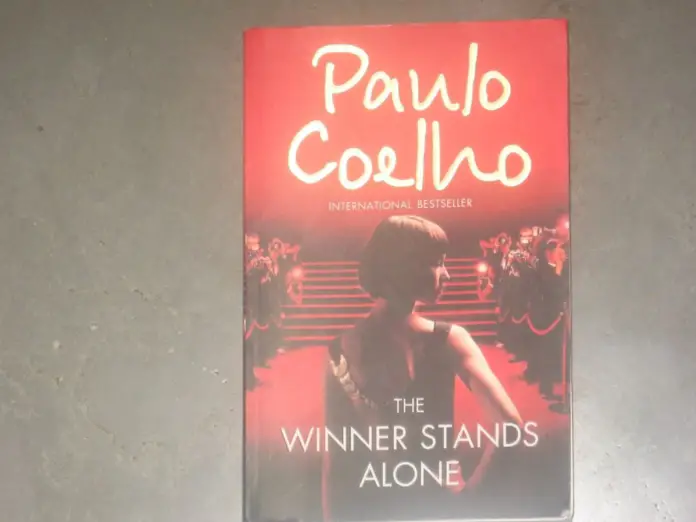The Winner Stands Alone was published in 2008, written by the widely admired Brazilian author Paulo Coelho whose best-selling book, The Alchemist, has garnered millions of fans all over the world.
The Winner Stands Alone, like most of Paulo Coelho’s works, falls in the genre of fiction and, according to the Deccan Herald, “is not a thriller but a stark portrait of where we are now”.
The novel takes place over a course of 24 hours and is set at the Cannes Film Festival, revolving around the global culture that values fame, success, glamour and celebrity status.
The novel revolves around the lives of the ‘super class’ – a class that is the most elite and one which sets the trends for the rest of the society to follow.
The super class forms a small percentage of global population and it is their actions and behaviours that influence the rest of the world.
Coelho, whose novels are usually based on ‘the importance of paying the price for following your dreams’, infuses a similar idea in this particular piece of fiction as well.
In The Winner Stands Alone, he manifests the price and sacrifice an individual has to pay for gaining fame and realizing their goals and aspirations and ambitions. Nothing comes for free. And the cost at which one will achieve their dream in the film industry is much higher and painful than in other careers.
Coming to the plot of the novel which is rather convoluted, the protagonist, Igor, is a Russian entrepreneur who is bent on ‘destroying the world’ to get back the love of his life, his wife Ewa. Ewa has left him for another man, Hamid Hafeez, who is a fashion courtier. Igor feels hurt and rejected. And on his journey to find Ewa back, he commits a series of murders.
Being a soldier who fought in the Afghan war, he is not afraid to kill. And he justifies his killings in the name of freeing people of their dark destiny.
“Was love, however great and however intense, sufficient justification for that?”
It is a question put forth by the author for the reader to think over.
Coelho then shifts focus on the ambience and people who belong to a world of cinema and the fashion industry.
“He’s in charge of pulling the strings, and the puppets feel themselves to be the most privileged and envied people on the planet, until one day for whatever reason the puppeteer decides to cut the strings, and the puppet falls down, lifeless and powerless.”
Who holds the power? Who is the puppet and who is the puppeteer?
The puppets, of course, are the models and actors whose life line is in the hands of the big producers and fashion courtiers for as long as they are young, beautiful and energetic. They are in the limelight, but as age envelopes them in its arms, they are no longer of use and discarded like a tissue paper in the rubbish bin!
Coelho then points to another fact, i.e. fashion. What is fashion in its true sense? It is a whole concept that is in sync with the trend in society. For example, environment is a hot topic these days and so the ‘trendsetters’ use it to sell their products. Anything related to the environment will be eminent, hence creating a demand pull effect.
The following quote aptly sums up the definition of fashion.
“Your designs have religious connotations, and fashion is, above all, about clothing the body, although it inevitably reflects a great deal of what’s going on in the soul as well.”
Coelho observes how fame will turn into power, the magic word which sows the seed of the ‘celebrity syndrome’. What is the ‘celebrity syndrome’?
It is what ruins and destroys careers, marriages, religious values and blinds the wise and ignorant alike.
The ‘celebrity syndrome’ happens when people forget their identity and it makes the identity they own of false judgement from the public. It is when the ‘celebrity’ stops innovating and falls in the comfort zone, halting their evolution and development.
The Cannes Film Festival is an event guided by ‘propaganda and lies’. It manipulates the human psyche and is a perpetrator of ‘intellectual violence’ being committed.
It is not about the awards for the best film but about promoting fashion and products one wouldn’t otherwise buy.
Coelho makes a statement through Igor saying “total power means total slavery….there is always a new mountain to climb”.
The statement reiterates George Orwell’s lines from ‘The Animal Farm’: “Power corrupts but absolute power corrupts absolutely.” And so Igor believes himself to be in a place where he is indispensable and he cannot deal with the feelings of rejection and hatred Ewa holds in her heart for him.
Igor kills four innocent people in his belief that he was ridding them of their dark future. But more than that he wanted to send the message across to Ewa, to return to him or else nothing but destruction will ensue.
Igor has a charismatic personality and his polite demeanor and eloquent tongue charms women. He will go to any limits, transgress any boundaries to win Ewa back, even if it involves murdering innocent people. And in his words:
“He has a mission. And his victims- or martyrs for love…are serving a greater purpose.”
“If sin achieves something good it is a virtue, and if virtue I deployed to call evil, it is a sin.”
Coelho defines the ‘Lucifer effect’. It is how God’s best servant turned into his rival.
“Absolute Evil has the heart of a child and takes no responsibility for its actions and is convinced that it’s right.”
Coelho delves deep into the psyche of an ambitious and powerful human. He draws a parallel with the devil, who holds hatred, vengeance and rancour in his heart because he cannot accept defeat. He cannot overcome the traumas life reeled out and believes in his omnipotence. Hence, he cannot give up his ‘mission’ irrespective of it being right or wrong!
Igor believes in the philosophy:
“One’s objective should always remain the same, even if the motive behind it may change over time.”
The quote “gratitude, necessity and the right contacts are all what you need for achieving anything at all,” points to a stark truth. In this world, these three things are the only ones that will help steer you in the direction you are headed at. It points at how selfish and self- centered a place this world is.
Whether Igor achieves his aim of reclaiming Ewa is something I will leave for the reader to find out. Will he kill her too, like all the others to prove his worth? Or will he spare her life and reunite with her?
Will Igor be found guilty? Will he be considered a suspect? Or will he escape? Will fate favour him or will he be caught and be punished?
The Winner Stands Alone is an easy read yet the thrill and suspense it creates in the reader’s mind is remarkable. Coelho has the talent to reach out to everyone out there.
According to the New Yorker:
“Coelho’s special talent seems to be his ability to speak to everyone at once. The kind of spirituality he espouses is to all comers…His readers often say that they see their own lives in his own books.”
“How can we stay innocent in a world of success?” An important question Coelho asks the reader to speculate upon.
On the whole, a great read. It deserves a chance to be contemplated upon.







